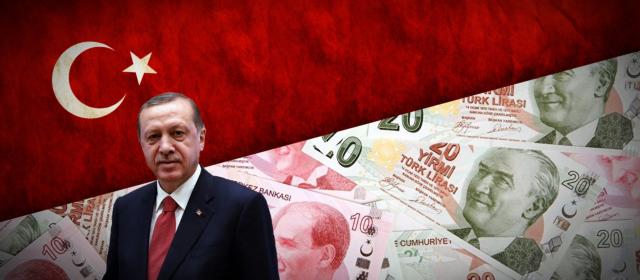The economic situation in Turkey is becoming increasingly tense. By dint of wanting to grow GDP at all costs, the country led by Recep Tayyip Erdogan has entered an inflationary spiral from which it will find it difficult to emerge. Prices have soared by more than 60% in one year. The accumulation of deficits makes foreign investors very nervous.
Turkey has changed a lot in the minds of international investors. The country led by Recep Tayyip Erdogan has accumulated economic shocks in recent years. First there was, in the summer of 2018, the tensions between the autocrat and his American alter ego, Donald Trump, which had prompted investors to sell their Turkish liras, then the Covid, which caused receipts to plunge. tourism in the country.
But that’s not all. If the country has resisted the effects of the pandemic rather well, political choices have greatly reinforced the difficulties of the post-Covid period. As inflation picked up a year ago, central banks in most emerging countries began raising interest rates to stem rising prices.
President Erdogan did not see things that way. He sacked the governor of the central bank and told his successor to cut rates to revive growth. They have fallen 500 basis points in three months and have not budged since December. Turkey being a production base for many European industrialists and exporting a lot to the Old Continent, lowering the rates should facilitate the financing of exporters and major works.
Economic situation in Turkey : An overheated economy
This policy allowed GDP to grow by 11% last year, after avoiding recession in 2020. But the economy is overheating. Capital outflows accelerated last autumn, the pound lost almost half of its value against the euro and the dollar, and inflation has now reached 61% over one year! In response, the government raised the minimum wage by 50% at the start of the year. Necessary but insufficient to sustain consumption.
Especially since Turkey is now facing another difficulty: the war in Ukraine is clearly weakening its economy. The conflict has pushed up the price of raw materials, especially wheat and oil, of which the country is a major importer. This will mechanically increase the current account deficit, even though investors are reluctant to finance the economy.
By dint of wanting to grow the GDP at all costs, the deficits have widened and have once again become a source of concern. Goldman Sachs economists expect the current account deficit to reach 4% of GDP this year. An “optimistic” estimate by their own admission, especially if commodity prices do not fall, the country being dependent on Russian and Ukrainian wheat.
Scope Ratings is much more pessimistic and anticipates a current account deficit of 8% of GDP. The rating agency is counting on a slowdown in growth to 2.3% this year and considers that “Turkey’s current trajectory is untenable”. For her, “Turkey’s unsustainable economic policies, spiraling inflation and currency depreciation increase the risk of deeper balance of payments, financial and political crises. »
The government could decide to require Turkish exporters to exchange 40% of their foreign currency in pounds, against 25% currently, according to the Bloomberg agency. A kind of capital control that does not say its name.
How long can this economic crisis in Turkey last?








Comments are closed